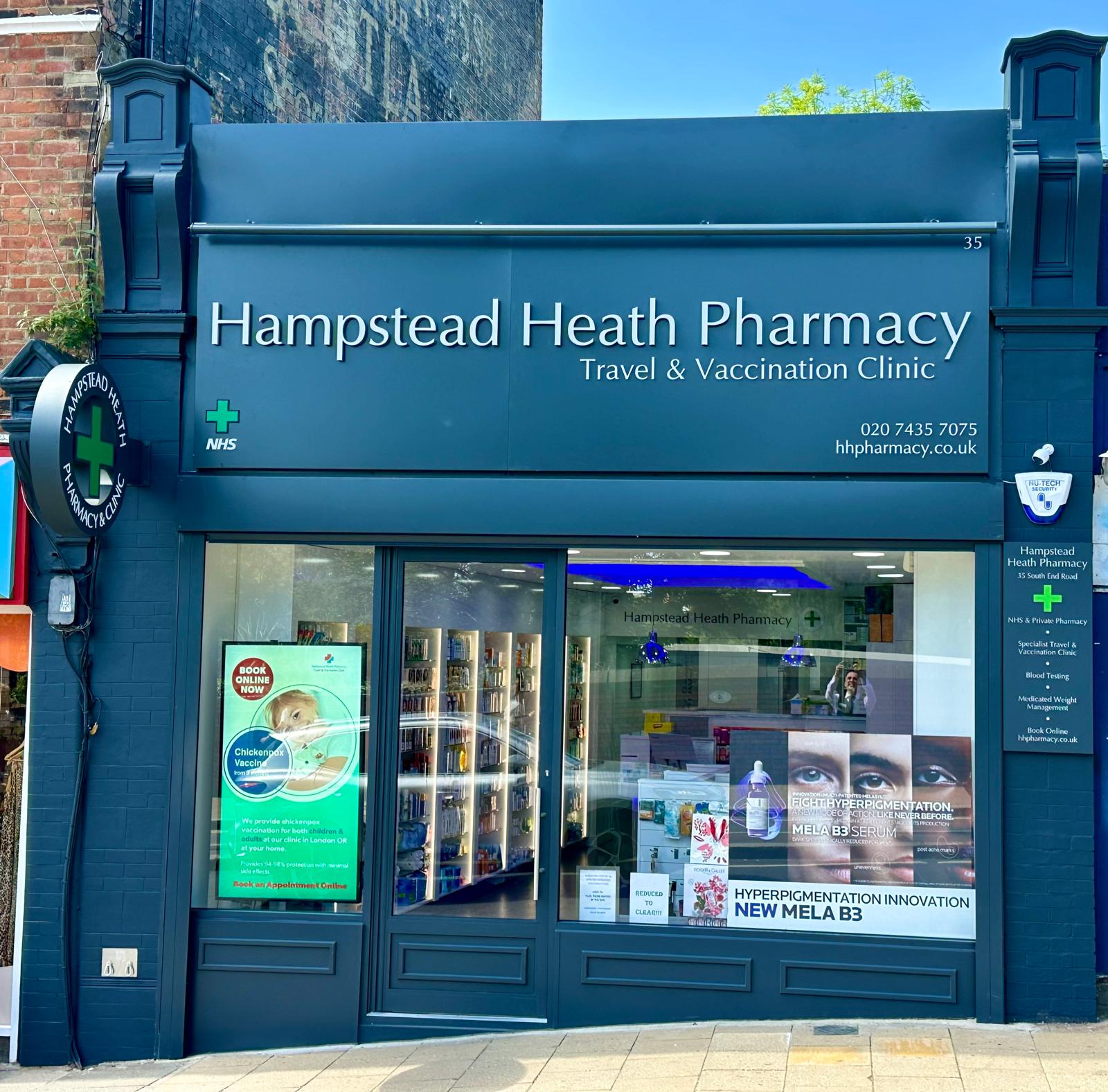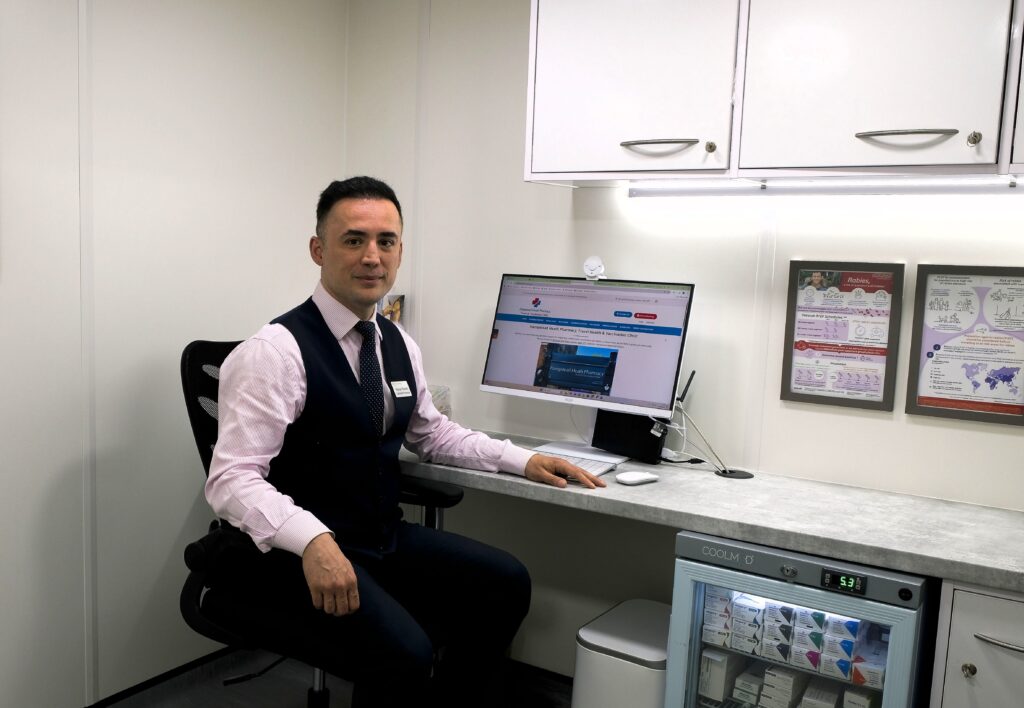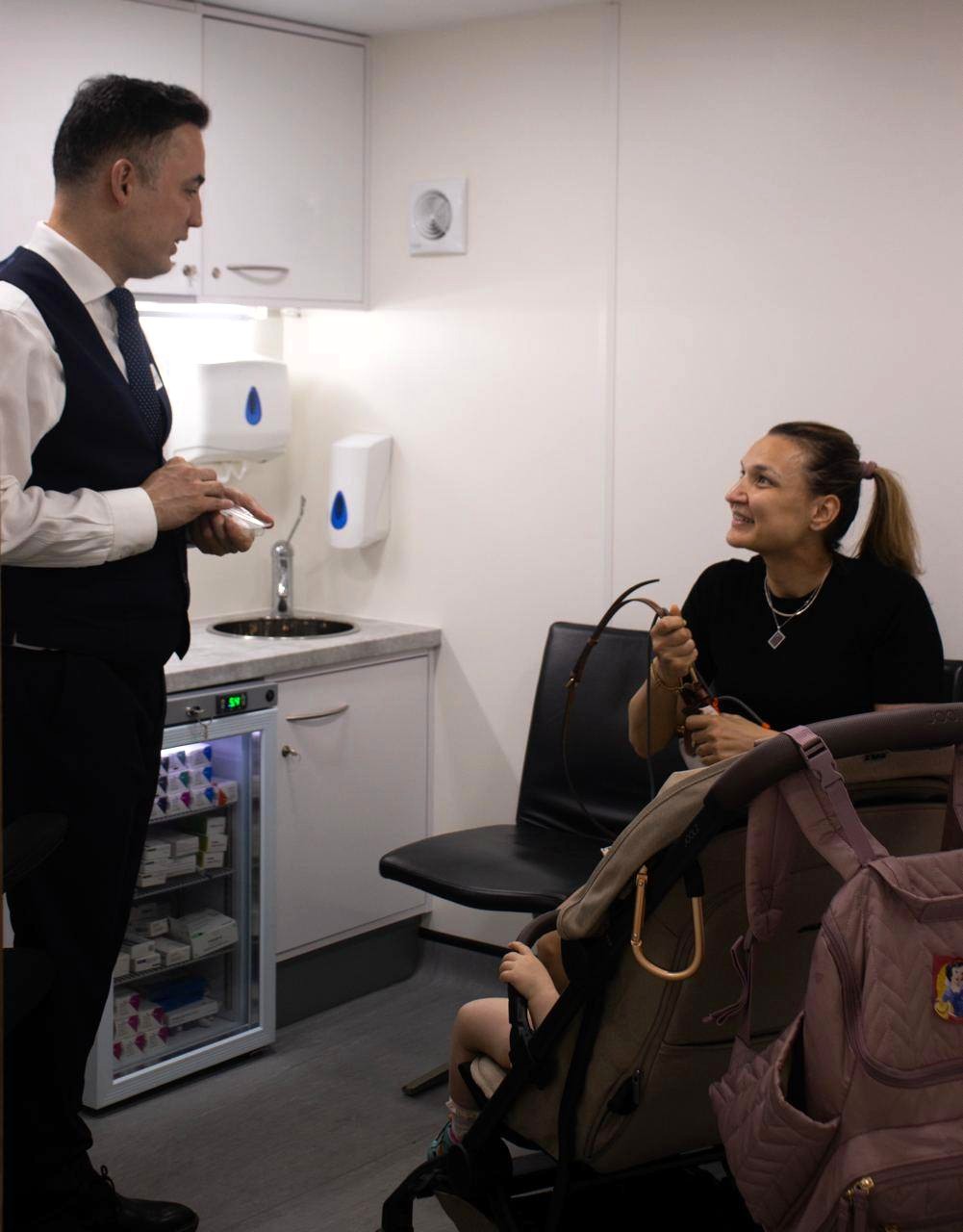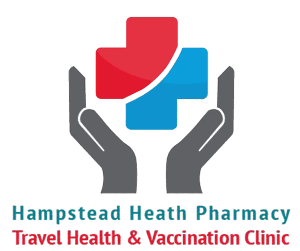Specialist Travel Clinic
Hampstead & North London
Expert travel medicine led by specialist prescriber pharmacist Mahyar Saremi.
MPharm, PGCert PharmPract, IPresc, MFTM RCPS(Glasg), CTH
Serving travellers across Hampstead, Belsize Park, Highgate, and wider North London since 2014. We stock all major UK-registered vaccines, including Rabies, Japanese Encephalitis, Chikungunya, and Dengue.
- Same-Day & Saturday Appointments
- Instant Online Booking
- Yellow Fever Centre
- Expert Antimalarial Advice
Located at 35 South End Road, London NW3 2PY

Expert Advice
All DestinationsLed by Prescriber
Specialist CareWhy Choose Our Specialist Travel Clinic in Hampstead?
When you travel, you leave the safety of the known behind. You need a medical partner who understands the specific health risks of your destination — not just a general pharmacy offering a limited menu of vaccines.
MFTM RCPS(Glasg)
Member of the Faculty of Travel Medicine at the Royal College of Physicians and Surgeons of Glasgow. This confirms elite expertise in managing complex travel medicine protocols.
CTH Certified
Holds a Certificate in Travel Health from the International Society of Travel Medicine (ISTM), ensuring our clinic operates to the absolute latest global standards.
IPresc Status
As an Independent Prescriber, Mahyar can comprehensively assess, prescribe, and administer all necessary vaccines and antimalarials directly to you on-site.
We Don’t Just “Give Jabs.” We Manage Risk.
Whether you are planning a high-altitude trek in Peru, a business trip to Lagos, or a family holiday in Thailand, our clinic creates a personalised travel health plan tailored to your destinations, activities, medical history, and the time you have before departure.

The Hampstead Heath Pharmacy Advantage
Preparing for a trip is stressful enough. Here’s how we make the health part effortless.
Every Vaccine, Always In Stock
We hold all UK-registered travel vaccines on site — including Rabies, Yellow Fever, Dengue, and Chikungunya (Vimkunya). No chasing stock, no wasted visits. When you book, your vaccine is waiting.
Saturday Clinics
Too busy during the week? Our fully staffed Saturday clinics mean you never need to take time off work to secure your essential travel health protection.
Book Online in 60 Seconds
No phone calls. View live availability, pick your slot, and receive instant confirmation — all securely online, 24/7. Your appointment is guaranteed immediately.
How the Hampstead Heath Pharmacy Travel Clinic Works
From booking to boarding, we make securing your travel health protection simple, fast, and stress-free.
Secure Your Slot 24/7
Select your preferred date and time through our secure online booking system. You will receive an instant confirmation via email.
Digital Health Brief
We’ll send you a short, secure form to capture your specific itinerary, medical history, and past vaccination records before you arrive.
Expert Clinical Consultation
Prescribing Pharmacist Mahyar Saremi will conduct a personalised risk assessment tailored exactly to your destinations, planned activities, and overall health status.
Same-Day Protection
All required vaccines and antimalarials are administered directly on the day. No follow-up appointments required to start your course.
NHS GP Records Automatically UpdatedTravel With Confidence
If your vaccine requires follow-up doses (like Rabies or Hepatitis B), we will schedule them immediately and send you automated reminders so you never miss a dose.
Travel Vaccines Available at Our Hampstead Clinic (NW3)
| Vaccine | Doses Required | Minimum Age | Duration of Protection |
|---|---|---|---|
| BCG (Tuberculosis) | 1 dose (Mantoux test may be required beforehand). | Newborn | Up to 20 years; may wane over time |
| Chikungunya (Vimkunya) | 1 dose | 12 years | Still being established |
| Cholera (Dukoral) | 2 oral doses (3 doses if under 6 years) | 2 years | ~2 years |
| Dengue (Qdenga) | 2 doses, 3 months apart | 4 years* | Still being established |
| Diphtheria, Tetanus & Polio (Revaxis) | Booster if last dose >10 years ago | 6 years | ~10 years per booster |
| Hepatitis A | 1 dose + booster at 6–12 months | 1 year | At least 25 years (with booster) |
| Hepatitis A+B (Ambirix) | 2 doses, 6–12 months apart | 1 year (up to 15 years) | See Hep A and Hep B |
| Hepatitis B | 3 doses (accelerated schedule available) | Birth | At least 20–30 years, likely lifelong |
| Influenza (Flu) | 1 dose (annual) | 6 months | ~1 year (seasonal) |
| Japanese Encephalitis (IXIARO) | 2 doses, 28 days apart | 2 months | ~12–24 months; booster at 1–2 years |
| Meningitis ACWY | 1 dose (2 doses if under 1 year) | 6 weeks | ~5 years |
| MMR (Measles, Mumps, Rubella) | 2 doses, 4 weeks apart (if non-immune) | 6 months (travel dose) | Lifelong (with 2-dose course) |
| Rabies (Verorab) | 4 intradermal doses over 1 week (2 doses on Day 0, 2 doses on Day 7)** | No lower limit | Lifelong priming; boosters based on risk |
| Tick-Borne Encephalitis (TicoVac) | 3 doses (accelerated schedule available) | 1 year | ~3–5 years; booster extends |
| Typhoid — Injectable (Typhim Vi) | 1 injection | 2 years | ~3 years |
| Typhoid — Oral (Vivotif) | 3 capsules (days 0, 2 and 4) | 5 years | ~3 years |
| Yellow Fever | 1 dose (lifelong certificate) | 9 months | Lifelong (single dose) |
*Qdenga is recommended for individuals with confirmed prior dengue infection. Vaccination may also be considered for those without prior dengue following specialist clinical assessment.
**Rabies Schedule: We use the latest WHO-aligned rabies pre-exposure schedule (intradermal), which is a licensed administration method for Verorab. This protocol provides lifelong priming in just two visits.
View current pricing on our Price List Page →
Sources: NaTHNaC, UKHSA Green Book, CDC, and EMC. Reviewed: Feb 2026.

Vaccine Experts
Family-Friendly Travel Clinic With Paediatric Expertise
We welcome families and have extensive experience vaccinating children of all ages. Our calm, reassuring approach means little ones (and their parents) are in safe hands.
- Combined family appointments to save you time
- Gentle, anxiety-free techniques for nervous children
- Specialist advice on child-specific travel health risks
Painless — and Our Reviews Prove It
Our gentle technique is one of the things patients mention most. Check our reviews — the word "painless" comes up a lot.
"I usually hate injections, but I honestly didn't even feel the Yellow Fever jab. Mahyar is incredibly skilled and totally put me at ease. Highly recommend for nervous travellers!"
"Brought my two young children in for their typhoid and hepatitis vaccines before our family holiday. The clinic was so welcoming, and the entire process was completely painless for them."
"So fast and efficient! Booked online, walked in, and was seen immediately. The antimalarial advice was spot-on, and the vaccines were quick and painless. Best travel clinic in London."
Our Location in Hampstead (NW3) & How to Find Us
Conveniently located in the heart of North London. Whether you're travelling by Tube, Overground, or car, getting your travel vaccinations is incredibly easy.
Hampstead Heath Pharmacy
-
Clinic Address
35 South End Road
Hampstead, London
NW3 2PY -
Public Transport
Overground: Located directly opposite Hampstead Heath Rail Station on the Mildmay line.
Tube: Belsize Park (Northern Line) is a short 10-minute walk. -
Parking Near the Clinic
Convenient Pay & Display parking is available along South End Road and the surrounding residential side streets.
Frequently Asked Questions
Everything you need to know about our Hampstead Heath Pharmacy's travel clinic.
How far in advance should I book my travel vaccinations?
We recommend booking 6–8 weeks before your departure. Certain vaccines, such as Rabies and Hepatitis B, require multiple doses over several weeks to provide full protection.
If you are travelling sooner, please still contact us or book online! We can often use accelerated dosing schedules to provide significant protection even a few days before departure.
Source: NaTHNaC TravelHealthPro →Can I get a Yellow Fever certificate on the same day?
Yes. Hampstead Heath Pharmacy is a designated Yellow Fever Vaccination Centre (YFVC) approved by NaTHNaC.
You will receive your International Certificate of Vaccination or Prophylaxis (ICVP)—signed, stamped, and valid for life—immediately after your vaccination in our NW3 clinic.
Do I need a GP or doctor referral for a private travel clinic?
No referral is needed. Our lead pharmacist, Mahyar Saremi, is a qualified Independent Prescriber (IPresc) and a Member of the Faculty of Travel Medicine.
He can independently assess your travel itinerary, prescribe, and administer all required vaccines and antimalarials in a single, seamless appointment.
Do you offer antimalarial tablets?
Yes. During your consultation, we will assess the malaria risk of your specific itinerary. If required, our prescribing pharmacist can prescribe and dispense the most appropriate antimalarial medication (such as Malarone, Doxycycline, or Lariam) directly to you on the day.
Can you provide medication for altitude sickness?
Yes. If your itinerary involves high-altitude destinations (such as trekking in the Himalayas, Andes, or Mount Kilimanjaro), our prescribing pharmacist can assess your risk.
If clinically appropriate, we can prescribe and supply Acetazolamide (Diamox) to help prevent Acute Mountain Sickness (AMS). Crucially, we will also provide expert advice on safe acclimatization strategies so you can minimize your risk without relying solely on medication.
Can I get standby antibiotics for traveller's diarrhoea?
Yes, we can help manage this risk. Traveller's diarrhoea is incredibly common and can severely disrupt a trip.
During your consultation, we will provide extensive advice on food and water hygiene. Depending on your destination and medical history, our independent prescriber can prescribe and supply a standby course of antibiotics for you to take with you, ensuring you have immediate treatment available if you fall ill abroad.
Do you offer treatments for jet lag?
We do. Crossing multiple time zones can take a heavy toll on your body. If you are concerned about jet lag impacting your holiday or business trip, we can discuss effective management strategies.
When clinically suitable, our prescribing pharmacist can prescribe and supply Melatonin, which can help reset your body's natural sleep-wake cycle and significantly reduce the effects of jet lag.
Do you offer travel vaccinations for children and babies?
Yes, we are a family-friendly clinic with extensive experience in paediatric travel vaccinations.
Please bring your child’s Personal Child Health Record (the "Red Book") or a printout of their NHS immunisation history to the appointment so we can accurately review their current vaccination status.
What if I don't know my previous vaccination history?
Don't worry! You can easily view your routine immunisation records via the NHS App. If you are unable to access them, our prescribing pharmacist will conduct a thorough risk assessment during your consultation to safely determine the best course of action for your trip.
What travel vaccines can I get for free on the NHS?
The NHS usually provides Hepatitis A, Typhoid, Cholera, and Diphtheria/Tetanus/Polio boosters free of charge through your registered GP surgery.
However, vaccines for Rabies, Yellow Fever, Japanese Encephalitis, Meningitis ACWY, Hepatitis B, Tick-Borne Encephalitis, Chikungunya, and Dengue are only available privately. We stock all of these routinely at our Hampstead clinic.
Source: NHS Travel Vaccinations →How much do travel vaccinations cost?
Prices vary depending on the specific vaccine and the number of doses required. We pride ourselves on being competitively priced for the North London area.
The cost of your initial consultation deposit is automatically deducted from your total bill on the day.
Book Your Travel Consultation in Hampstead
Join thousands of travellers who trust our specialist North London clinic for expert protection and same-day peace of mind.
Can't see the form? Click the button above to book directly.
✓ Medically Reviewed
Mahyar Saremi, Superintendent Pharmacist Prescriber
GPhC Registration: 2069409
Last reviewed: February 2026 | Next review due: February 2027
